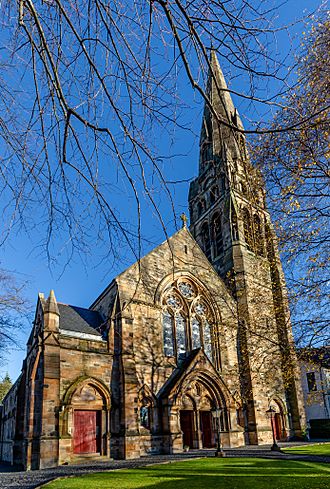Crosshill Queen's Park Church facts for kids
Quick facts for kids Crosshill Queen's Park Church |
|
|---|---|

The building in 2018
|
|
| General information | |
| Status | Residential flats |
| Architectural style | French Gothic |
| Address | 40, Queen's Drive |
| Town or city | Glasgow |
| Country | Scotland |
| Coordinates | 55°49′55″N 4°15′41″W / 55.831941°N 4.261366°W |
| Groundbreaking | 1872 |
| Completed | 1873 |
| Closed | 2000 (as a church) |
| Design and construction | |
| Architect | Campbell Douglas & James Sellars |
|
Listed Building – Category A
|
|
| Designated: | 5 December 1989 |
| Reference #: | LB32451 |
The Crosshill Queen's Park Church is an old building in Glasgow, Scotland. It was built in the 1800s as a church. Today, it has been changed into homes, called residential flats. It is located near Queen's Park.
Contents
Building History
How the Church Was Built
The building started as Queen's Park Established Church. It was designed by two architects, Campbell Douglas and James Sellars. Construction began in 1872 and finished in 1873. The church was built in a special style called French Gothic. This style often features tall arches and detailed stone work.
A tall, pointed tower, known as a steeple, was also part of the design. This steeple had an octagonal (eight-sided) stone spire. The church officially opened its doors on October 12, 1873.
Changes Over Time
In 1929, the church joined with the Church of Scotland. Its name was changed to Queen's Park High Church. This new name helped people tell it apart from another nearby church, Queen's Park West Church.
Later, in 1957, a beautiful stained glass window was added. It was made by an artist named Charles Paine. The window showed a scene called the "adoration of the Magi."
Mergers and Closure
In 1972, another church, Crosshill Victoria, joined with Queen's Park High. Together, they formed the Crosshill Queen's Park Church.
However, by 1999, fewer people were attending the church. Because of this, plans were made to combine Crosshill Queen's Park with Strathbungo Queen's Park. The very last church service at Crosshill Queen's Park Church happened on Sunday, February 13, 2000. The two churches officially joined together a few days later, on February 16.
New Life as Homes
After closing as a church, the Crosshill Queen's Park Church building was sold. Between 2002 and 2004, it was transformed. The inside was changed to create modern residential flats. This means the old church building is now a place where people live.
The building is also recognized as an important historical site. In December 1989, its special status was upgraded. It became a Category A Listed Building, which is the highest level of protection for historic buildings in Scotland.

